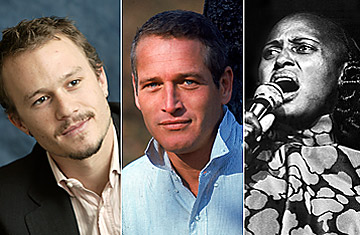
(3 of 4)
DIRECTORS
Arguably the greatest filmmaker to die last year, Bruce Conner, 74, was a full-service artist, creating assemblages, working in photography and drawing, and creating seminal works in the canon of truly independent cinema. His 1958 A Movie (comprising 12 minutes of found footage subversively edited into a meditation on sex and death) and the 1962 Cosmic Ray (with a stripper dancing to Ray Charles' What'd I Say) birthed a subgenre of avant-garde films and inspired the '60s wave of multimedia art in concert halls and discos. (Conner also designed light shows at San Francisco's Avalon Ballroom.) Some of his films were more politically explicit — Report, on the Kennedy assassination, and Crossroads, on the A bomb — but all were things of beauty and horror. Conner is survived by Jean Sandstedt, his wife of 50 years.
Kon Ichikawa, 93, directed some of the finest Japanese films of the '50s: the war parable Fires on the Plain, the pacifist The Burmese Harp, the kinky, contemplative Odd Obsession. His most enthralling epic is Tokyo Olympiad, a record of the 1964 Olympics that stands with Leni Riefenstahl's Olympia as the great art-reportage of the summer games Xie Jin, 84, a preeminent director in Mao's China, is best known for Two Stage Sisters, an assured melodrama about a country girl who joins a rep company. During the Cultural Revolution the film was charged with advocating "the reconciliation of social classes," and Xie Jin (like most other Chinese directors) made no films for a decade. After rehabilitation, he did the international hit Hibiscus Town.
Jean Delannoy, 100, directed the forbidden-love hit La symphonie pastorale, from the André Gide novel, in 1946; the following decade, his precise dramas became the butt of young turks like Truffaut and Jean-Luc Godard who formed France's New Wave. Back when the international audience got much of its fun, sex and sentiment from Italian movies, Dino Risi, 91, provided robust entertainment in many genres. Among his 80-some features were 17 starring Vittorio Gassman, most prominently the cynical social fable Il Sorpasso / The Easy Life and the blind-officer-on-a-toot drama Profuma di Donna / Scent of a Woman, remade in Hollywood with Al Pacino. Risi's string of affairs with gorgeous actresses, including Anita Ekberg and Alida Valli, provides the answer to the question: Why do guys become directors?
SCREENWRITERS
John Michael Hayes, 89, batted out radio crime shows before becoming Alfred Hitchcock's go-to screenwriter in the mid-50s, penning Rear Window, To Catch a Thief, The Trouble With Harry and The Man Who Knew Too Much. An Oscar nomination for Peyton Place launched Hayes as the favored writer of elevated sleaze: Butterfield 8, The Carpetbaggers and the Carroll Baker Harlow.
Sheldon Keller, 85, was one of the crazy-gifted kids who wrote for Sid Caesar and Your Show of Shows; later he won a Writers Guild Award for the Hollywood parody Movie Movie and co-authored the movie Buona Sera, Mrs. Campbell, remade with ABBA songs as Mamma Mia! Many a memorable MGM musical — Meet Me in St. Louis, Yolanda and the Thief, Ziegfeld Follies and (uncredited) The Wizard of Oz — sprang from the typewriter of Irving Brecher, 94. After writing the Bye Bye Birdie screenplay, Brecher began a retirement that lasted 45 years. I wish the same for us all.
And from one typist to some departed others, I write farewell to Malvin Wald, 90, whose script for the 1948 The Naked City served as basis for hundreds of police procedurals (and the excellent TV series); to Ennio De Concini, 84, a screenwriter for nearly 60 years in the Italian film industry, and an Oscar-winner for the sublimely misanthropic Divorce Italian Style; and to Golden Age TV dramatists Abby Mann, 80 (Judgment at Nuremberg), William Gibson, 94 (The Miracle Worker) and Tad Mosel, 86, who later wrote Up the Down Staircase for director Robert Mulligan, and whose Broadway adaptation of TIME movie critic James Agee's memoir All the Way Home won the 1961 Pulitzer Prize.
Some novelists and playwrights moonlighted in the movies. As a writer whose crime novels inspired a couple dozen movies (seven of them French), Donald Westlake, 76, could have retired with honors in the 60s, after Godard turned The Jugger into Made in USA and The Hunter became John Boorman's Point Blank. In the 70s he owned the comedy-caper genre, for what that's worth, with The Hot Rock, Bank Shot and Hot Stuff. He wrote scripts based on his own novels and those of other crime writers, incl. Jim Thompson's The Grifters (Oscar nomination) and Patricia Highsmith's Ripley Under Ground. He knew the difference in the two crafts: "If I write a novel, I'm a god. If I write a screenplay, I'm a minor deity." Westlake died of a heart attack New Year's Eve while on a rare vacation, in Mexico.
Adieu to Alain Robbe-Grillet, 85, a founding father of the postwar nouveau roman movement who wrote the script for Alain Resnais' Last Year at Marienbad, that ultra-chic chess game of adultery and fabulous frocks. Robbe-Grillet then channel much of his energy into filmmaking, with such kinky mystifiers as Trans-Europ Express, The Man Who Lies and the cunningly titled Progressive Slidings of Pleasure. Simon Gray, 71, wrote for the stage (where many of his tart, smart comedies were directed by Pinter) and stayed there. Fortunately, his best play, Butley, is preserved on film, along with Alan Bates's brilliant performance as a bluff, self-lacerating teacher in domestic and career crisis.
